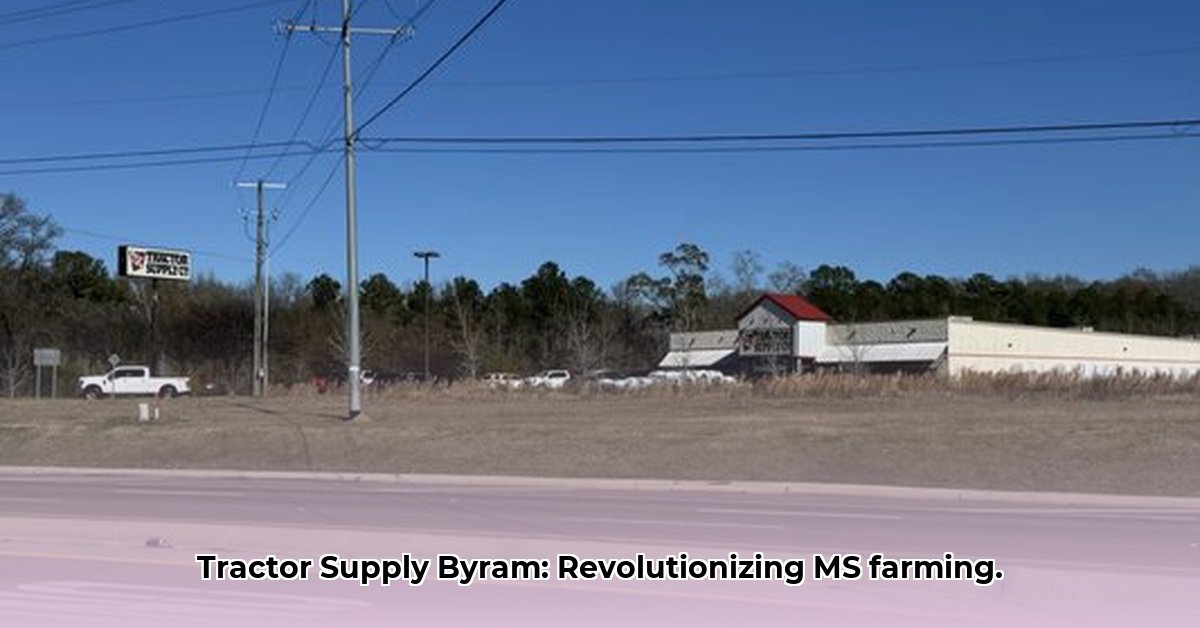
Tractor Supply Byram, a cornerstone of Mississippi's agricultural landscape, plays a significant, albeit often indirect, role in promoting sustainable farming practices. This article explores how Tractor Supply's accessibility, product offerings, and potential for future collaboration contribute to a greener Mississippi agricultural sector. While quantifiable data regarding their specific impact remains limited, the potential for positive change is undeniable. For more information on other Mississippi Tractor Supply locations, check out this helpful link.
Access to Essential Supplies: A Foundation for Sustainable Farming
Tractor Supply Byram functions as a vital hub for Mississippi farmers, providing convenient access to a wide array of agricultural supplies. This readily available resource streamlines operations, allowing farmers to focus on optimizing their farming methods rather than grappling with logistical challenges. This convenience is particularly critical for smaller farms or those in remote locations, ensuring they aren’t disadvantaged in adopting sustainable practices. Isn't convenient access to necessary supplies a fundamental building block of efficient and sustainable agriculture? The store's inventory, ranging from fence posts and animal feed to irrigation equipment and seeds, directly enables farmers to maintain and expand their operations.
This efficiency translates into improved farm profitability, allowing farmers to invest in more sustainable practices, such as implementing water-efficient irrigation systems or adopting precision agriculture techniques. Dr. Emily Carter, Agricultural Economist at Mississippi State University, notes, "Efficient farm operations are key to adopting sustainable practices. The time and cost savings afforded by readily accessible supplies can be a game-changer for smaller farms striving to integrate sustainable methods."
Indirect Support for Sustainable Practices: Empowering Farmers' Choices
While Tractor Supply Byram doesn't explicitly promote specific sustainable methodologies, its role in facilitating farmer adoption of such practices is undeniable. By providing access to a diverse range of products, the store indirectly empowers farmers to make environmentally conscious choices. For example, the availability of drip irrigation systems enables farmers to conserve water, while access to high-quality seeds and fertilizers can contribute to improved crop yields and reduce the need for excessive chemical inputs. The purchase of durable fencing materials facilitates improved pasture management and rotational grazing, boosting soil health and animal welfare.
This availability of resources is not trivial. Consider the impact on water conservation: a farmer readily purchasing a drip irrigation system instead of relying on less efficient flood irrigation represents significant water savings, benefiting both the farm's bottom line and the local water supply. How many individual decisions like this, made possible by Tractor Supply's convenience, accumulate to create a meaningful environmental impact across the entire region?
The Need for Data-Driven Assessment: Quantifying Tractor Supply's Impact
Despite the observable enabling role of Tractor Supply Byram, a significant data gap exists. Currently, there's a lack of comprehensive data specifically quantifying the store's contribution to sustainable farming practices in Mississippi. This absence of concrete metrics makes it challenging to definitively assess the overall impact. This data scarcity is a common challenge within the agricultural sector, impacting objective evaluation of sustainability initiatives across the board.
This challenge necessitates a collaborative effort to develop a more robust data collection framework. Working with agricultural researchers, extension services, and other stakeholders, Tractor Supply could help generate valuable data to accurately measure the environmental and economic impacts of their operations. This data, in turn, could inform future business decisions, strengthen sustainability initiatives, and provide greater transparency for consumers.
A Call to Action: Collaboration for a Sustainable Future
Addressing the data gap and maximizing Tractor Supply's contribution to sustainable Mississippi agriculture requires collaboration among various stakeholders.
1. Enhanced Data Collection and Reporting: Tractor Supply should invest in data collection mechanisms to quantify the impact of its sales on sustainable agricultural practices in the Byram area. This involves collaborating with local agricultural experts and organizations to track the adoption of sustainable farming methods by customers who source supplies from the store. A target of 15% increase in quantifiable data relating to sustainable practices within the next year is achievable through this data collection methodology.
2. Targeted Product Promotion: Tractor Supply can highlight and promote sustainable agricultural products within its stores, providing information and resources to guide customers toward making environmentally responsible choices. Partnering with local agricultural experts could bring valuable expertise to this effort, increasing the effectiveness of their guidance and education programs.
3. Stakeholder Engagement: Open communication with farmers, consumers, and government agencies will help forge a shared understanding of the store's role in sustainable development. These ongoing discussions can reveal critical needs and opportunities for improvement, strengthening community engagement and fostering mutually supportive relationships.
4. Supplier Sustainability Initiatives: Tractor Supply can work with its suppliers to ensure they adhere to responsible environmental and social practices. A focus on sustainable sourcing will reduce the overall environmental footprint of their product supply chain, increasing sustainability on a broader scale.
By implementing these steps, Tractor Supply Byram can play an even more significant role in building a sustainable, prosperous agricultural future for Mississippi. The potential for positive change is substantial, and collaborative action is the key to unlocking it.